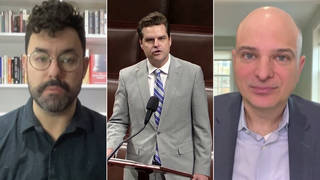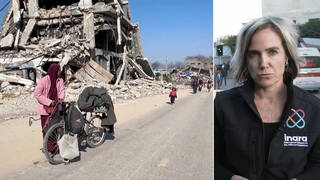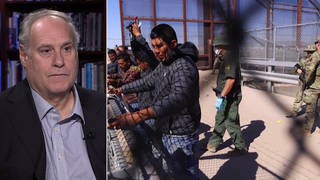
Related
As talks at the Glasgow U.N. climate summit accelerate, we look at how the roots of the climate crisis date back to Western colonialism with award-winning Indian author Amitav Ghosh, who examines the violent exploitation of human life and the natural environment in his new book, “The Nutmeg’s Curse: Parables for a Planet in Crisis.” Ghosh speaks about the political significance of fossil fuels in global politics, saying that “if fossil fuels were to be completely substituted at scale, what you would have is the complete inversion of the world’s geopolitical order.” Ghosh’s previous books include “The Great Derangement: Climate Change and the Unthinkable” and the novel “Gun Island.”
Transcript
AMY GOODMAN: This is Democracy Now!, democracynow.org, Climate Countdown. I’m Amy Goodman, with Juan González, as we end today’s show with the prize-winning Indian writer Amitav Ghosh. His new book is titled The Nutmeg’s Curse: Parables for a Planet in Crisis. Ghosh writes about how the roots of the climate crisis date back to Western colonialism and the violent exploitation of human life and the natural environment. Amitav Ghosh’s previous books include The Great Derangement: Climate Change and the Unthinkable and the novel Gun Island. He’s joining us from his home in Brooklyn, New York.
Welcome to Democracy Now! It’s great to have you with us. We last spoke to you at the beginning of COVID and how it was ravaging India. And here we are in the second week of the COP. Your book is getting rave reviews, The Nutmeg’s Curse. Tell the story of the climate crisis through the nutmeg.
AMITAV GHOSH: Well, thank you very much for having me on, Amy. Very nice to be on your show again.
Well, you know, I really look upon the climate crisis as a process of violence, you know? And it’s a process of violence both against humans and against the Earth. And this process goes back, in my view, really, to the 17th century, the 16th century, the European conquest of the Americas, and also the European conquest of large parts of Asia.
So, the story of The Nutmeg’s Curse actually begins in a completely forgotten place, the Banda Islands, which are in the extreme east of Indonesia, a tiny archipelago. But this archipelago had an amazing tree, which was the nutmeg tree, which produces both nutmeg and mace.
Anyway, to put a long story short, you know, the Europeans went to the Indian Ocean, made — went straight to the Banda Islands as quickly as they could, and they tried to impose monopolies on the nutmeg, on the nutmeg trade. But, of course, the Banda Islanders resisted. But, ultimately, what this led to was that, in 1621, the Dutch East India Company actually implemented a final solution. They just eliminated the entire population of the islands, you know, about 15,000 people. Many of them were just killed. Many of them were enslaved. Others died of starvation and disease and so on. And, of course, this was a story that was also unfolding on the other end of the English and Dutch empires — that is, in the northeastern United States.
But, you know, in the case of the Banda Islands, what makes the story so poignant, in my view, is that, you know, at the heart of it is this tree, a sort of miraculous tree of life. And this tree became — which was a great blessing to the islanders for centuries, finally became a terrible curse. And that curse is, in fact, an instance of the resource curse.
And that is what we see now unfolding around the world all around us. It was so interesting to hear Nnimmo Bassey talking about, let’s say, Nigeria and how the deltas there are becoming really unlivable for people, again, because of the resource curse, because of the resource curse of oil. We’ve seen so many countries just destroyed because of this resource curse. Iraq is a good example, as so many other countries, as well.
So, I think, really, what is happening today is that we are seeing a model which came into being in the 17th century, in this period, really, the start of the so-called Enlightenment, and this model is now — it has been globalized on a planetary scale, and that it is literally sort of devouring our planet.
JUAN GONZÁLEZ: And, Amitav, I wanted to ask you specifically about that. You suggest in your book that the period of the Enlightenment led to a way of looking at Earth as the repository of resources made only for human use and consumption. But I wanted to ask you: Even if we were able, as a planet, to shift from fossil fuels to renewable energy, wouldn’t there still be the problem of this, the overproduction of capitalism right now, that we’d have the problem then of having to deal with the e-waste, of all the batteries for the electric cars and the constant changing of our batteries every year because the companies have to keep producing new models and keep the consumption flow going? So, I’m wondering how you deal with this issue of the consumer society that capitalism so depends on now.
AMITAV GHOSH: Well, that’s a very good question. That’s absolutely the case. You know, we seem to proceed on the understanding that energy produced by fossil fuels can just be easily replaced by renewables, and that’s all there is to it, as it were. But that’s not the case at all, of course. Even renewable energy requires, you know, inputs of so many other kinds of materials — rare earth, for one thing, many kinds of minerals. But just think of even those windmills. I mean, they’re just these enormous structures of concrete. And concrete is also — the production of concrete produces a lot of greenhouse gases.
But apart from that, you know, the thing about fossil fuels, the reason why they have become so deeply entrenched in our lives is not just because they produce energy, but it’s because they produce a kind of energy that interacts with structures of power in very specific ways. So, for example, consider China. I mean, China is, of course, by now, by far the leader in the production of renewable energy. But imagine if China were able to completely reduce its dependence on fossil fuels and switch to renewable energies. It would completely overturn the geopolitical order of the world today, because the geopolitics of the world really depends on the shipping of fossil fuels, you know, through these particular chokepoints. Two of the most important chokepoints are the Strait of Hormuz and the Strait of Malacca. And, you know, something like 40% of the world’s oil ship through these chokepoints every day. So, on controlling these chokepoints depends, actually, Western geopolitical dominance. And if fossil fuels were to be completely substituted at scale, what you would have is a complete inversion of the world’s geopolitical order.
And I think this is actually what we don’t talk about when we go to these negotiations. Nnimmo Bassey talked about militarization and so on. And I think what we are seeing around us, silently sort of unfolding around us, is exactly this dynamic, this logic, you know, whereby the things that we don’t speak about really are those that have come to control the planet and really have come to control our lives in so many ways. For example, it was interesting to hear Nancy Pelosi talk about, you know, making the military less dependent on fossil fuels. But, in fact, you know, the U.S. military today really serves as the global protector of fossil fuel movements. So, you know, in a sense, the entire security structure of the world has become completely dependent upon the movements and flows of fossil fuels. So, I think these are the unpredictable things that we simply can’t — are unable to acknowledge, as it were. But they need to be acknowledged; otherwise, you know, these negotiations become really just the kind of sham that, in fact, Nnimmo was describing.
AMY GOODMAN: Amitav Ghosh, I want to do a live little correct here. If you could come a little closer to the computer and hold the mic a little closer to your mouth, it will be easier to hear you. But I wanted to read you a little bit from The Guardian. Speaking at the world leaders’ summit at the U.N. in Glasgow, the Indian prime minister, Narendra Modi, “made five key pledges for how India would decarbonize over the next few decades. India, a developing country of more than 1.3 billion people, is the world’s third-largest emitter of carbon dioxide after the U.S. and China,” the last remaining major economy that held out on a net zero commitment. He now says he’ll get to it by — I think it’s around 2070. Your thoughts on the rule of Narendra Modi and what it means, for example, not to commit, when it comes to use of energy, to ending coal?
AMITAV GHOSH: Well, Amy, can you hear me better now?
AMY GOODMAN: Yes, a little better.
AMITAV GHOSH: Yes. Well, look, let’s just admit straightaway that these net zero commitments are a kind of farce, in any case. I mean, people are just pulling these numbers out of their heads. And a large part of this is simply because around the world today leaders have become experts at greenwashing. They talk this language of greenwashing. And around the world, you know, even the most benign-sounding people, like Justin Trudeau, I mean, they talk this greenwashing rhetoric, but at the same time they’re constantly licensing more and more fossil fuel exploration.
And that is exactly what Narendra Modi is doing, as well. You know, I mean, he’s talking a sort of greenwashing talk. At the same time, they’ve licensed 55 new coal plants, you know, which are going to come up in India’s forests. These coal mines are going to wreck the lives of hundreds of thousands of forest-dwelling Adivasis, or Indigenous peoples, perhaps millions of them. Fortunately, this year, at least some Adivasis from India were able to be present at COP26. They were able to actually articulate their positions and their points of view. But, essentially, what this Narendra Modi’s government has done — and it’s not just his government, even the Congress governments before that were doing the same thing — was they were opening all of India up to the most rapacious kinds of extractive industries. It’s a terrible process to witness.
JUAN GONZÁLEZ: Amitav Ghosh, in your book, you also emphasize what you call radical empathy. Could you explain what that means and how that potentially could have an emancipatory effect with respect to climate crisis?
AMITAV GHOSH: Well, as we were saying earlier, in going back to the Enlightenment, the 17th century and so on, we get this mechanistic vision of the Earth as something that’s dead, as something that really exists only to provide people, you know, powerful human beings, with resources. And I think, at bottom, we just have to move away from that, move away completely to a different way of envisioning the Earth, you know? I am a writer, and so I think stories play a very fundamental part in this. But I do think this can actually have an important political impact.
I mean, if you look at the people who have resisted fossil fuel industries most effectively in America, they’re Indigenous peoples. I mean, I know that you and Amy have been covering the No DAPL movement for a very long time. And as you know, their ideas about the sacredness of the Earth were very important to that movement, you know? It’s not necessarily something that you or the press always emphasizes. But, in fact, the longevity of that movement, the resilience of that movement really depends on Native American ideas of the sacredness of the Earth, of the vitality of the Earth.
And, you know, movements like that are now appearing all around the world. In fact, you could even say that India spearheaded some of these movements. We had a movement called the Chipko movement, when women hugged trees to prevent their being cut down. But, you know, one of the sort of really, really positive things that I see in the world today is that even high courts and supreme courts are beginning to recognize these ideas. I mean, in New Zealand recently, there was a judgment from — I think it was the Supreme Court — that recognized the personhood of a river. So, I think these ideas are becoming more and more widespread. And I think they could lead to a sort of change of heart across the Earth.
AMY GOODMAN: We want to thank you so much for being with us, Amitav Ghosh, award-winning Indian novelist and writer. His new book is just out. It’s called The Nutmeg’s Curse: Parables for a Planet in Crisis. And that does it for our show. His previous book, The Great Derangement.
Tomorrow on Democracy Now!, we’ll speak to climate scientist Kevin Anderson and the writer George Monbiot.
Democracy Now! currently has job openings. Go to democracynow.org.
Democracy Now! is produced with Renée Feltz, Mike Burke, Deena Guzder, Messiah Rhodes, Nermeen Shaikh, María Taracena, Tami Woronoff, Charina Nadura, Sam Alcoff, Tey-Marie Astudillo, John Hamilton, Robby Karran, Hany Massoud and Adriano Contreras. Our general manager is Julie Crosby. Special thanks to Becca Staley, Paul Powell, Mike Di Filippo, Miguel Nogueira. I’m Amy Goodman, with Juan González.













Media Options